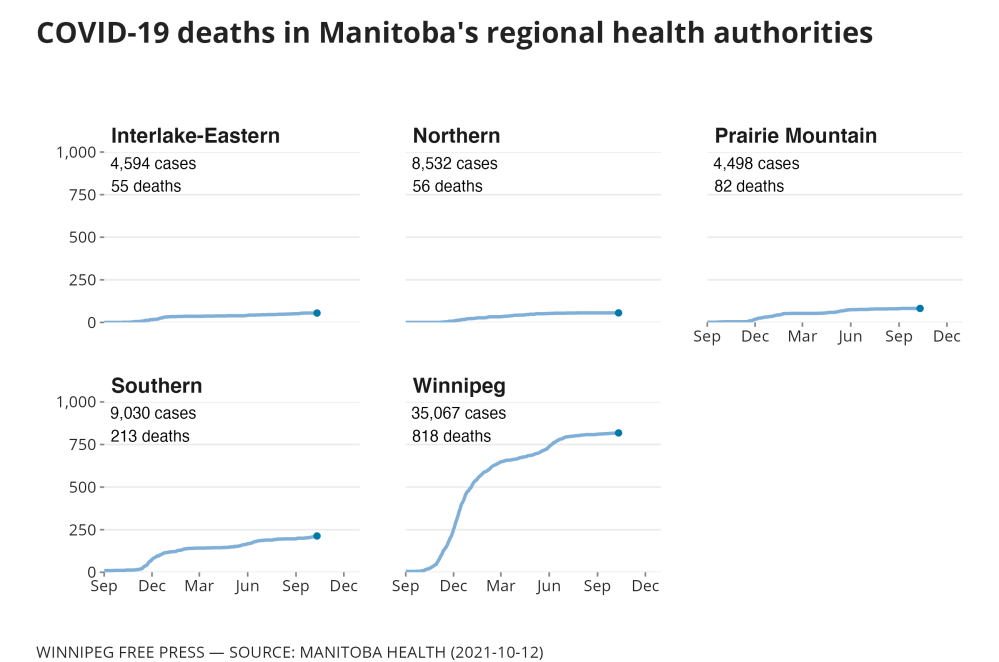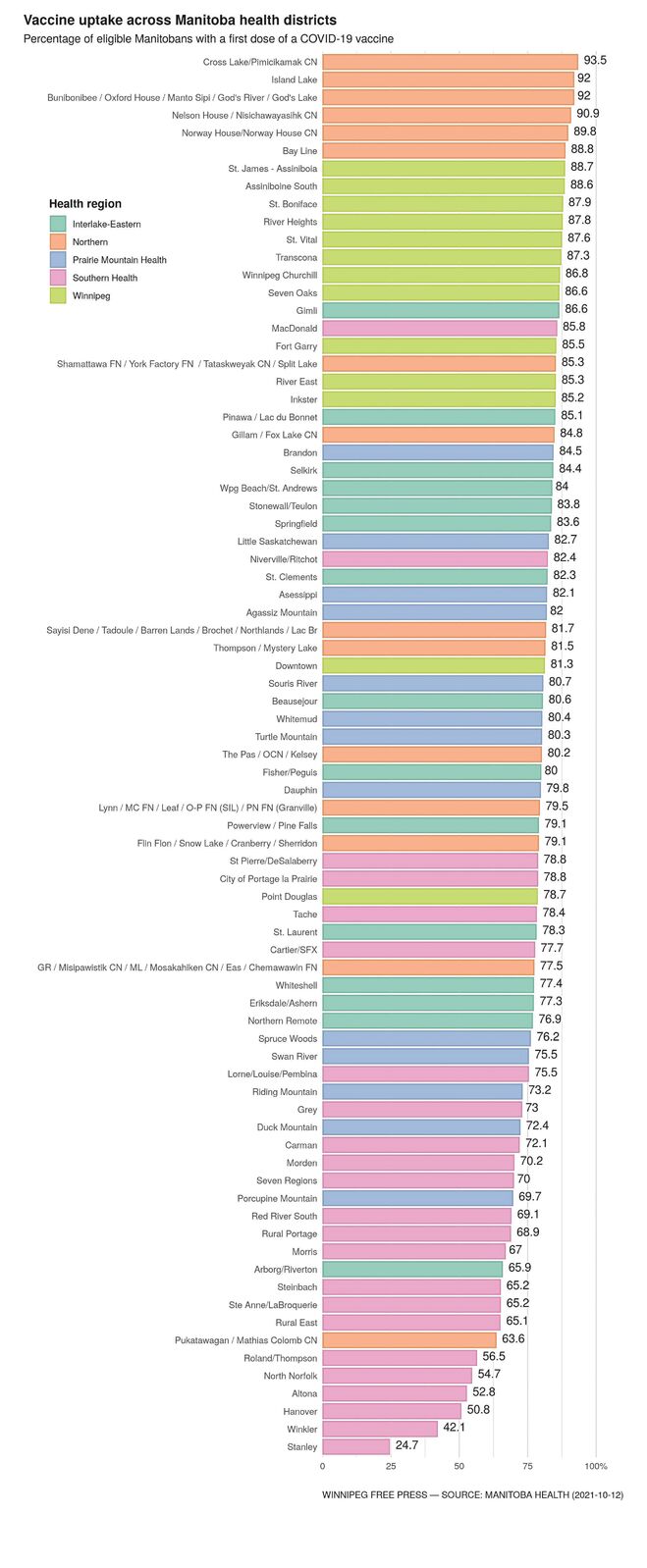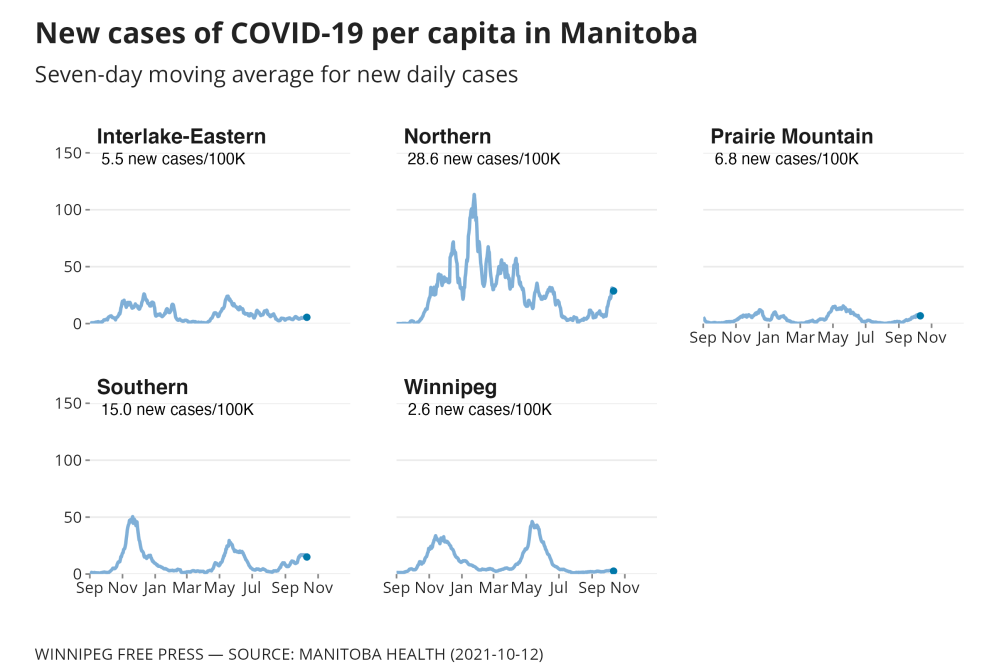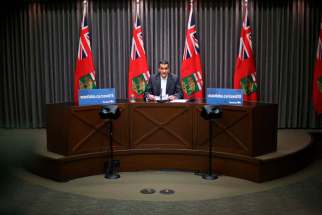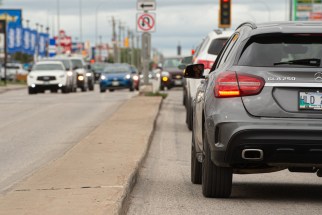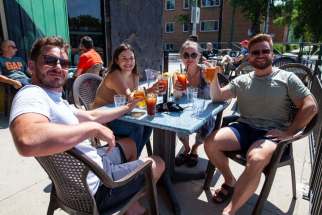Province tries to curb COVID spread in South Majority of long weekend deaths in least-vaccinated health region; self-isolation rules tightened, situation expected to worsen
Read this article for free:
or
Already have an account? Log in here »
To continue reading, please subscribe:
Monthly Digital Subscription
$0 for the first 4 weeks*
- Enjoy unlimited reading on winnipegfreepress.com
- Read the E-Edition, our digital replica newspaper
- Access News Break, our award-winning app
- Play interactive puzzles
*No charge for 4 weeks then price increases to the regular rate of $19.00 plus GST every four weeks. Offer available to new and qualified returning subscribers only. Cancel any time.
Monthly Digital Subscription
$4.75/week*
- Enjoy unlimited reading on winnipegfreepress.com
- Read the E-Edition, our digital replica newspaper
- Access News Break, our award-winning app
- Play interactive puzzles
*Billed as $19 plus GST every four weeks. Cancel any time.
To continue reading, please subscribe:
Add Free Press access to your Brandon Sun subscription for only an additional
$1 for the first 4 weeks*
*Your next subscription payment will increase by $1.00 and you will be charged $16.99 plus GST for four weeks. After four weeks, your payment will increase to $23.99 plus GST every four weeks.
Read unlimited articles for free today:
or
Already have an account? Log in here »
Hey there, time traveller!
This article was published 12/10/2021 (1519 days ago), so information in it may no longer be current.
Southern Manitoba will face new self-isolation rules after the province announced Tuesday that the majority of COVID-19 related deaths over the long weekend came from the province’s least-vaccinated health district.
People in Southern Health who live with someone who has symptoms of COVID-19 or is a close contact of someone with the virus will also have to self-isolate, deputy chief provincial public health officer Dr. Jazz Atwal said after seven people from the region died due to COVID-19 over the past five days.
Exemptions exist for people who are fully vaccinated, had a diagnosed case of COVID-19 in the past six months or are asymptomatic and participating in a regular rapid-testing program.
Atwal said it is expected that people from Southern Health will continue to be over-represented among severe outcomes and deaths in the coming weeks.
“Disproportionately the cases are there, disproportionately we’re seeing hospitalizations come from Southern Health-Sante Sud and disproportionately we’re going to see fatalities from there, as well,” he said.
“That’s what we’re trying to curtail with these newer measures in place, and that’s what we’re trying to curtail with the orders that we have, to really mitigate and limit interactions of those who are vaccinated and unvaccinated and to promote vaccine uptake.”
The region has roughly 15 per cent of Manitoba’s population but makes up 25 per cent of the province’s active COVID-19 cases.
As of Tuesday, 66.7 per cent of eligible people in Southern Health had received at least one vaccine dose, the lowest immunization rate in the province.
The region also includes the districts of Winkler and the RM of Stanley, which had immunization rates of 42.4 per cent and 24.9 per cent, respectively.
Of the 85 Manitobans in hospital being treated for COVID-19 Tuesday, 33 (or 39 per cent) were from Southern Health; 56 per cent of COVID-19 patients in intensive care were from the region.
Longtime Winkler doctor Don Klassen called the high case counts and deaths in the Southern Health region an “inevitable” result of low vaccine uptake.
“I think, just as it’s been seen in other provinces… the likelihood has to be that we will see more cases, a disproportionate number, from the regions that are at the lowest vaccination rates,” he said.
Klassen, who has practised in Winkler for more than four decades, said medical professionals in the area are focusing on one-on-one conversations with unvaccinated patients and changing individual minds.
“I would hope that a good number of the folks here who are not yet vaccinated would take the opportunity to speak with their health-care providers or people they trust, and weigh the evidence,” he said.
Currently, the region is reporting the second-highest rate of infection in Manitoba after the North.
Atwal said two localized outbreaks on isolated First Nations communities, including one large outbreak on Mathias Colomb Cree Nation, are behind the inflated infection rate.
By contrast, the Southern Health region — an area covering more than 27,000-square-kilometres — is seeing widespread, unchecked transmission of the virus.
Last week, Manitoba public health said 47 per cent of recent cases there could not be traced back to a specific source.
“We’re seeing much more of a diffuse nature of cases throughout the region,” Atwal said.
“We needed to break transmission chains as much as possible within that region and, hence, we made some stricter measures in regards to case and contact management.”
Compliance with public-health requirements for testing, case management and isolation has been an issue in the region, Atwal acknowledged.
“We’re working with the region, we’re working with stakeholders on the ground to work at understanding and working with public health in relation to the public-health measures, we’re also working with them in relation to vaccine uptake,” he said.
“A tremendous amount of work is being done there.”
Morden Mayor Brandon Burley said he wasn’t surprised that the province was facing hurdles getting people tested in the region, saying he believed there were many more COVID-19-positive people walking around than there are actually getting tested.
“Ultimately, this is why the province is hesitant about even releasing Southern Health numbers, is because they aren’t representative of anything useful,” he said. “They’ve been skewed by people who refuse to do the right thing. And that’s a shame.”
“When I see these numbers, it’s not surprising, it’s not shocking, both because we have such high numbers of unvaccinated populations, but also the fact that we seem to have decided that prevention and identification is bad as well.
“It’s possibly the two worst ideas put together at the worst time possible in human history, to have these anti-scientific views, and it’s to the point now where we’re not even allowing the medical professionals in our communities to do their job until we’re presenting… on death’s door.”
Despite the rising case counts in the area, about 60 unvaccinated southern Manitoba health-care workers, including some employed at personal care homes and Boundary Trails Health Centre, are planning a group walkout coinciding with Oct. 18, when testing for unvaccinated provincial staff begins.
The walkout, which was confirmed to the Free Press by Burley and health-care staff in the region, is being organized with plans for employees to leave their jobs permanently.
“What they’re trying to say is that they feel like they’re dispensable, and they’re trying to make the point they’re not,” Burley said.
“I think it will leave a bit of a lurch. Senior personnel are aware of it at Boundary Trails, and I would assume appropriate contingencies will be put in place in the event it happens.”
Southern Health officials did not respond to a request for comment.
Atwal said current public-health restrictions could be modified if conditions do not improve in the region. However, the focus remains on vaccine promotion and education as well as collaboration with community leaders, he said.
malak.abas@freepress.mb.ca
danielle.dasilva@freepress.mb.ca
Think about flu shot: Atwal
Manitobans are being encouraged to book their seasonal influenza vaccine shots as doses arrive at pharmacies and medical clinics across the province.
Deputy chief provincial public health officer Dr. Jazz Atwal said the official launch of the flu vaccine campaign is still being finalized, but it’s not too early to think about getting the shot.
Last year, 31.5 per cent of Manitobans were vaccinated, marking a significant increase from the year before. Only seven cases of the flu were detected during the 2020-2021 reporting season.
Atwal said public-health measures meant to slow the spread of COVID-19 in place last winter also kept influenza at bay.
“This year, with the measures in place, we know it’s going to have an impact on influenza, but we know we’re also going to allow a lot more interactions to occur,” he said. “Now those interactions will lead to transmission of other viruses.”
Atwal said public health doesn’t yet have a clear picture on the severity of the coming flu season, but it’s anticipated that there will be more cases and some hospitalizations, compared to last year.
— Staff


Our newsroom depends on a growing audience of readers to power our journalism. If you are not a paid reader, please consider becoming a subscriber.
Our newsroom depends on its audience of readers to power our journalism. Thank you for your support.

